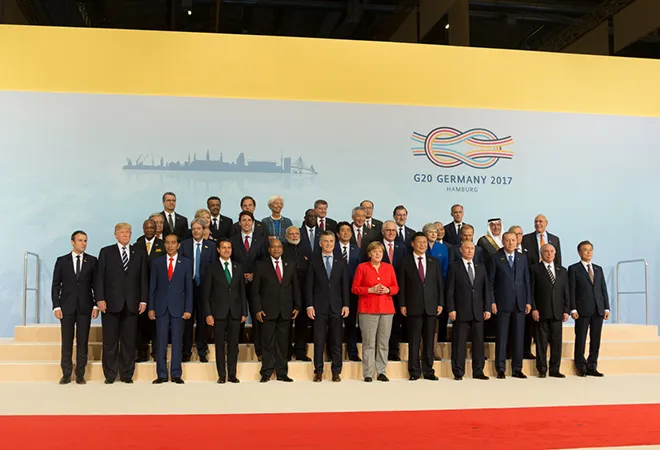Despite the evident geopolitical shifts across the world and the political churn among its member nations, the G20 remains one of the most relevant organisations in the architecture of global governance. Recent global developments both provide an opportunity and pose a challenge for the body if it is to remain influential.
The G20's most important task is to ensure that it stays true to its core mandate, maintaining global financial stability and managing structural reforms in an inextricably integrated world. The G20 was premised on and motivated by the realisation that the "one country, one vote" approach of the United Nations is not the most effective way to respond to critical problems requiring real-time responses. The credit crisis of 2007–2008 demonstrated that certain international challenges need to be addressed efficiently and speedily, which, in effect, catalysed the institutional preeminence of the G20.
At a time when many members of the G20 are finding themselves trapped by domestic compulsions that are forcing them to rethink the G20's core mandate, the G20's temptation to maintain its relevance by anchoring itself in a different agenda needs to be resisted.
The global economy is hardly out of the woods. The G20 is a special-purpose policy forum that was created to respond to globally catastrophic problems by nations that have capacity and wherewithal. This is hardly the time for the G20 to expand its membership by conjuring up new partnerships, such as with African countries. Expanding the group's partnerships at this juncture would just create another G77 — and for what purpose?
"This is hardly the time for the G20 to expand its membership by conjuring up new partnerships, such as with African countries."
It is also time to recognise that some of the fundamental structural challenges that the G20 is attempting to address cannot be adequately treated unless certain micro-issues are addressed as well. These micro-issues, such as the ongoing transformation in global energy systems, cyberstabilty of financial structures, and the implication of technology on employment and jobs, among others, do need to be on the table, but the temptation to make all issues of global concern a part of the G20 agenda must be resisted. This would only dilute the ability of the G20 to serve its founding purpose. Matters better brought up at the UN General Assembly and/or at other multilateral institutions should not be under the purview of this group.
The G20 should instead narrow its scope to sectors that implicate the global financial and trading systems and additionally only focus on those issues that concern politically disruptive global trends.
The G20 is at a crossroads. It should choose the path that will allow it stay relevant to the core purpose for which its members first came together.
This commentary originally appeared in CFR.
The views expressed above belong to the author(s). ORF research and analyses now available on Telegram! Click here to access our curated content — blogs, longforms and interviews.




 PREV
PREV



